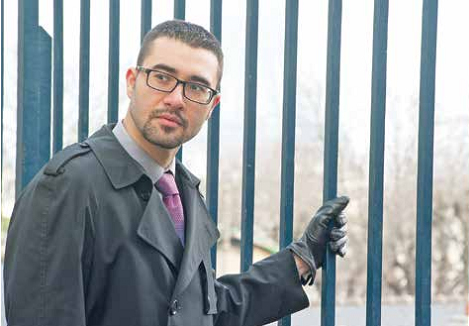Güray Başol, Turkish pianist, says that music has no passport and no borders. We interviewed him to find out more about him.
Starting playing such a demanding instrument as piano at the late age of 15? And becoming the top pianist? Almost unbelievable and unachievable. But Güray Başol did it somehow. He explained that playing piano and progressing quickly was just like falling in love: inevitable.
Recently, famous Turkish pianist Güray Başol visited Belgrade and performed there, collecting praises and enthusiasm both from the audience and the critics alike. We talked to him about his beginnings, life, plans and the impressions from Serbia.
There is a commonplace story that you cannot be a high-class musician, especially if you are not in pop-rock music, unless you start very early. And yet, you began at the age of 15? How can you explain your swift perfecting?
When I was a child, my father was playing the guitar and singing pop music. It was a great pleasure listening to him at home but I never thought that I’d be a professional musician and earn a living with music. I have started playing the piano at the age of 15 at Istanbul Fine Arts High School. Being a concert pianist was so difficult because it was too late for me, then I played the guitar but the piano was always attractive at that time as it is nowadays. I worked really hard during my studies at high school. My teacher thought that I was asking for the impossible, but now I think that I made a good choice for my life. It is really difficult to explain my progress on piano, it is like falling in love, one cannot explain how and why it happens.
Turkey, like Serbia, is a country with strong folk tradition and slightly smaller artistic music market. And yet again, you decided on a much serious style of music. How did you sway towards it?
We cannot consider that the classical music is more serious than folk music. If you look at the origin of the classical music, you can find German or French folk themes in Beethoven’s or Mozart’s music. We can claim that the folk music forms the basis of classical music. When I choose to play the piano as an instrument, the repertoire that I can perform is mostly the pieces of classical music composers. That is why I perform this repertoire. The piano is a polyphonic instrument and we cannot find the monophonic traditional music written for it. You can play some transcription of popular melodies on the piano but I am not sure, if it sounds original or appropriate.
After your training in Turkey you moved to France to continue your studies in Chamber Music with Nina Patarcec and Analysis with Jean-Dominique Pasquier. Following your time at the “École Normale de Musique de Paris”, you continued your studies in the “National Rueil-Malmaison Conservatory” for three years with Chantal Riou. How was it for you during that period?
When I arrived to Paris, I was really shocked about the high level of the pianists. So I needed to work more than I have imagined before. I also tried to learn about music as much as I could, not only about piano, also about music theory. For me, being a pianist is not only playing the notes. If you have no idea what you are playing, if you don’t research how this music must sound and why it must sound like that, you cannot become a pianist; you could be a piano player and we have lots of those nowadays. The master degree that I did on musicology at Sorbonne University was for having an idea about, how the research is done and for researching the style of the composers which helped me a lot for my interpretations.
Who were and are your „idols“? Both „classical“ and other musicians and composers?
I admire Idil Biret. Her repertoire is just amazing, I do not need to talk about her virtuosity, besides she is so kind and has a very positive character. I also love Martha Argerich’s style, her interpretation is unbelievable, such colour, so much energy! When you read the biographies of classical composers, they had really difficult lives and after all those difficulties, they left excellent compositions for the humanity. Such a pity that they didn’t have the life that they deserved.
What music you sincerely like to perform best, you enjoy most? And what is your favourite performance in the past?
I love performing Chopin, it is really difficult to perform his music but there is something really deep inside it. I think it is impossible to perform his music in a satisfying way but you can try to interpret it in your own way. I think a real performer does not have a favorite performance; you can be happy to introduce your work to the public correctly but for me, it is impossible to perform as you desire. There is always something to add from you to the work which never ends. That is the beauty of the music and also the frightening thing about it, because you have no limit.
What are your future plans?
I hope to visit Serbia again. It was really a great pleasure to perform in Belgrade. The audience was really warm, listened very carefully and I felt it. I will try to keep giving the concerts as much as I can, I would like to communicate my music to larger audiences. In my opinion, music has no passport and no borders so it is accessible for everybody and the art is the only weapon against terrorism so we need to use it all the time.
